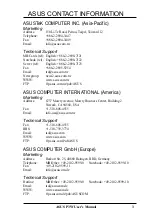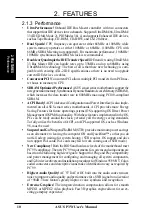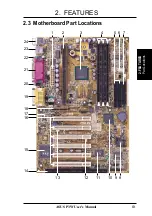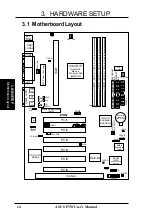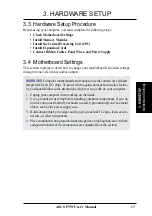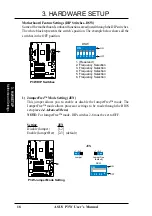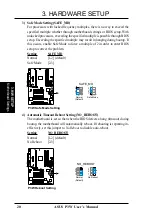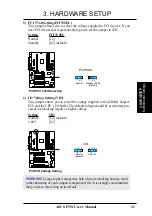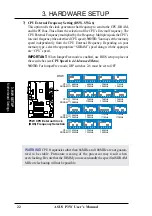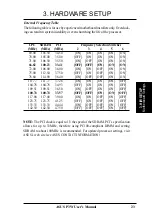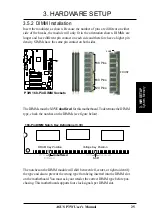
10
ASUS P3W User’s Manual
2. FEATURES
Performance
2. FEA
TURES
2.1.3 Performance
•
UltraPerformance! Onboard IDE Bus Master controller with two connectors
that support four IDE devices in two channels. Supports UltraDMA/66, UltraDMA/
33 (IDE DMA Mode 2), PIO Modes 3 & 4, and supports Enhanced IDE devices,
such as Tape Backup, CD-ROM, CD-R/RW, and LS-120 drives.
•
Dual Speeds! CPU frequency can operate at either 66MHz or 100MHz while
system memory operates at either 100MHz or 66MHz. (100MHz CPU with
66MHz SDRAM setting not supported). For maximum performance, 100MHz/
100MHz synchronous host/DRAM clock is recommended.
•
Double or Quadruple the IDE Transfer Speed! IDE transfers using UltraDMA/
33 Bus Master IDE can handle rates up to 33MB/s and up to 66MB/s using
UltraDMA/66 technology. The best of all is that these new technology is com-
patible with existing ATA-2 IDE specifications so there is no need to upgrade
current IDE devices or cables.
•
Concurrent PCI! Concurrent PCI allows multiple PCI transfers from PCI mas-
ter buses to memory to CPU.
•
SDRAM Optimized Performance! ASUS smart series motherboards support the
new generation memory, Synchronous Dynamic Random Access Memory (SDRAM),
which increases the data transfer rate to 800MB/s max using PC100-compliant
SDRAM.
•
ACPI Ready! ACPI (Advanced Configuration and Power Interface) is also imple-
mented on all ASUS smart series motherboards. ACPI provides more Energy
Saving Features for future operating systems (OS) supporting OS Direct Power
Management (OSPM) functionality. With these features implemented in the OS,
PCs can be ready around the clock, yet satisfy all the energy saving standards.
To fully utilize the benefits of ACPI, an ACPI-supported OS, such as Windows
98, must be used.
•
Suspend and Go! Suspend-To-RAM (STR) provides maximum power savings
as an alternative to leaving the computer ON and QuickStart™ so that you do
not fall asleep waiting for system bootup. (STR requires OS support and does
not support ISA cards; ISA cards may fail to work coming out of STR mode.)
•
New Compliancy! Both the BIOS and hardware levels of the motherboard meet
PC’99 compliancy. The new PC’99 requirements for systems and components are
based on the following high-level goals: Support for Plug and Play compatibility
and power management for configuring and managing all system components,
and 32-bit device drivers and installation procedures for Windows 95/98/NT. Color-
coded connectors and descriptive icons make identification easy as required by
PC’99.
•
Highest Audio Quality! AC’97 DAC/ADC built into the audio codec reduces
noise to improve audio quality and performance for a SNR (signal to noise ratio)
of +90dB. These features greatly improve voice synthesis and recognition.
•
Extreme Graphics! The integrated motion compensation allows for smooth
MPEG1 or MPEG2 video playback. Fast 3D graphics engine allows for an ex-
citing gameplay experience.



